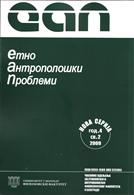À propos du concept de l’oubli de Lévi-Strauss. Structure de communication perturbée et styles de pensée dans la Serbie en transition
In regard to Levi-Strauss’s "motive of oblivion". Structure of disturbed communication and styles of thoughts in transitory Serbia
Author(s): Dragana AntonijevićSubject(s): Anthropology, Semantics, German Idealism, Structuralism and Post-Structuralism, Politics and society, Social Norms / Social Control
Published by: Филозофски факултет, Универзитет у Београду
Keywords: Levi-Strauss’s "motive of oblivion"; structure of disturbed communication; styles and communities of thoughts; modes of veridiction; transition;
Summary/Abstract: This paper starts with Levi-Strauss’s semantic concept that consists of oblivion, misunderstanding, indiscretion and nostalgia. Through his analysis of North American and Greek myths, Levi-Strauss concluded that "semantic filed of oblivion" has an important meaning especially in the construction of particular rules and rituals; or, in other words, it has an important part in the introduction of culture to the nature of cognitive and social processes. After the introduction of concept Structure of disturbed communication and some corrections to the Levi-Strauss’s concept, I start with the proposition that the period of transition represents unstable and ‘slippery’ time in which society negotiates different meanings. That is the time when different styles of thoughts, represented by different and powerful groups that have an impact on current social, political and ideological processes, compete with each other fighting for supremacy. Their field of communication can be seen as a field of "disturbed communication", which in the final instance has a normative function: to reinforce and regulate certain attitudes, ideas and knowledge. This is achieved through the narratives which symbolise a community of newly established order in the moment of its supposed socio-historical stabilisation. Finally, combining two different theoretical models – Levi-Strauss’s one described above with Greimas’s ideas about structures of modes of veridiction, this paper predicts chances of particular paradigmatic forms of thought in transitory Serbia to became dominant modes of thought, despite of their current low visibility in the public sphere. In mythical terms, it seems though that their domineering efforts are predetermined to success or fail, since they position themselves according to the laws immanent to these structures themselves, which on their part a priori position these structures as powerful or powerless, influential or non-influential communities of thought.
Journal: Етноантрополошки проблеми
- Issue Year: 4/2009
- Issue No: 2
- Page Range: 167-197
- Page Count: 31
- Language: French

